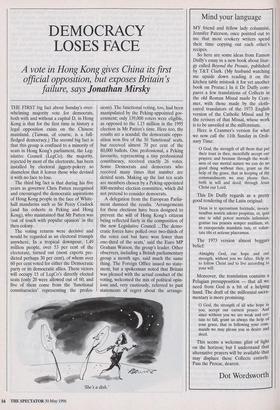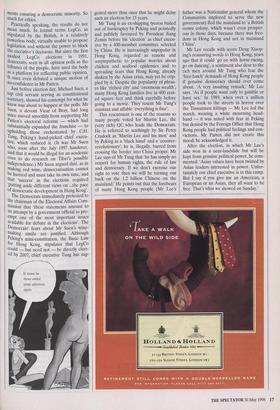DEMOCRACY LOSES FACE
A vote in Hong Kong gives China its first official opposition, but exposes Britain's
failure, says Jonathan Mirsky THE FIRST big fact about Sunday's over- whelming majority vote for democrats, both with and without a capital D, in Hong Kong is that for the first time in history a legal opposition exists on the Chinese mainland. (Taiwan, of course, is a full- fledged democracy.) The second big fact is that this group is confined to a minority of seats in Hong Kong's parliament, the Leg- islative Council (LegCo); the majority, rejected by most of the electorate, has been installed by electoral jiggery-pokery so shameless that it leaves those who devised it with no face to lose.
The third big fact is that during his five years as governor Chris Patten recognised and encouraged the democratic aspirations of Hong Kong people in the face of White- hall mandarins such as Sir Percy Cradock (and his cohorts in Peking and Hong Kong), who maintained that Mr Patten was `out of touch with popular opinion' in the then colony.
The voting returns were decisive and would be regarded as an electoral triumph anywhere. In a tropical downpour, 1.49 million people, over 53 per cent of the electorate, turned out (most experts pre- dicted perhaps 30 per cent), of whom over 60 per cent voted for either the Democratic party or its democratic allies. These victors will occupy 15 of LegCo's directly elected seats (only 20 were allowed out of 60, and five of them come from the 'functional constituencies' representing the profes- sions). The functional voting, too, had been manipulated by the Peking-appointed gov- ernment; only 139,000 voters were eligible, as opposed to the 1.15 million in the 1995 election in Mr Patten's time. Here too, the results are a scandal: the democratic oppo- sition won five of the 30 'functional' seats, but received almost 70 per cent of the 80,000 ballots. One professional, a Peking favourite, representing a tiny professional constituency, received exactly 26 votes. Some Democrats and democrats who received many times that number are denied seats. Making up the last ten seats are members chosen by a Peking-appointed 800-member election committee, which did not pretend to consider democrats.
A delegation from the European Parlia- ment damned the results. 'Arrangements for these elections have been designed to prevent the will of Hong Kong's citizens being reflected fairly in the composition of the new Legislative Council ...The demo- cratic forces have polled over two-thirds of the votes cast but have won fewer than one-third of the seats,' said the Euro MP Graham Watson, the group's leader. Other observers, including a British parliamentary group a month ago, said much the same thing. The Foreign Office issued no state- ment, but a spokesman noted that Britain was pleased with the actual conduct of the voting, welcomed the mix of political opin- ions and, very cautiously, referred to past statements of regret about the arrange- `She's a dish.' ments ensuring a democratic minority. So much for ethics.
Practically speaking, the results do not mean much. In formal terms LegCo, as stipulated by the British, is a relatively Powerless body, virtually unable to propose legislation and without the power to block the executive's decisions. But since the first modest LegCo elections in 1991, democrats, seen in all opinion polls as the tribunes of the people, have used the body as a platform for reflecting public opinion. It once even debated a unique motion of no-confidence in Mr Patten.
Just before election day, Michael Suen, a top civil servant serving as constitutional secretary, showed his contempt for what he knew was about to happen at the polls. Mr Suen, a devout Vicar of Bray, had long Since moved smoothly from supporting Mr Patten's electoral reforms — which had substantially expanded the franchise — to upholding those orchestrated by C.H. Tung, Peking's hand-picked chief execu- tive, which reduced it. (It was Mr Suen who, soon after the July 1997 handover, said that it would be illegal for an academic even to do research on Tibet's possible independence.) Mr Suen argued that, as in making red wine, democratisation cannot be hurried and must take its own time, and that 'success' in the elections required putting aside different views on ...the pace of democratic development in Hong Kong'. The Democrats immediately protested to the chairman of the Electoral Affairs Com- mission that 'these statements amount to an attempt by a government official to pre- empt one of the most important issues available for debate in the elections'. The Democrats' fears about Mr Suen's wine- Taking simile are justified. Although Peking's mini-constitution, the Basic Law for Hong Kong, stipulates that LegCo could — but need not — be directly elect- ed by 2007, chief executive Tung has sug- gested more than once that he might delay such an election for 15 years.
Mr Tung is an ex-shipping tycoon bailed out of bankruptcy by Peking and pointedly and publicly favoured by President Jiang Zemin before his 'election' as chief execu- tive by a 400-member committee selected by China. He is increasingly unpopular in Hong Kong, regarded as remote and unsympathetic to popular worries about chicken and seafood epidemics and to spreading fears that Hong Kong, already shaken by the Asian crisis, may yet be crip- pled by it. Despite the popularity of phras- es like 'richest city' and 'enormous wealth', many Hong Kong families live in 400 rent- ed square feet and think carefully before going to a movie. They resent Mr Tung's constant and affable 'everything is fine'.
This resentment is one of the reasons so many people voted for Martin Lee, the (very rich) QC who leads the Democrats. He is referred to scathingly by Sir Percy Cradock as 'Martin Lee and his men' and by Peking as a 'black hand' and a 'counter- revolutionary'; he is, illegally, barred from crossing the border into China proper. Mr Lee says of Mr Tung that 'he has simply no respect for human rights, the rule of law and democracy. If we don't exercise our right to vote then we will be turning our back on the 1.2 billion Chinese on the mainland.' He points out that the forebears of many Hong Kong people (Mr Lee's father was a Nationalist general whom the Communists implored to serve the new government) fled the mainland to 'a British crown colony, which wasn't even prosper- ous in those days, because there was free- dom in Hong Kong and not in mainland China'.
Mr Lee recalls with scorn Deng Xiaop- ing's reassuring words to Hong Kong, years ago that it could 'go on with horse-racing, go on dancing', a sentiment also dear to the rich men around Mr Tung who fear the `free-lunch' demands of Hong Kong people if genuine democracy should ever come about. 'A very insulting remark,' Mr Lee says. 'As if people want only to gamble or have sex.' In 1989, when over a million people took to the streets in horror over the Tiananmen killings — Mr Lee led the march, wearing a white mourning head- band — it was noted with fear in Peking but denied by the Foreign Office that Hong Kong people had political feelings and con- victions. Mr Patten did not create this mood; he acknowledged it.
After the election, in which Mr Lee's side won in a near-landslide but will be kept from genuine political power, he com- mented: 'Asian values have been twisted by Asian leaders interested in power. Unfor- tunately our chief executive is in this camp. But I say if you give me an American, a European or an Asian, they all want to be free. That's what we showed on Sunday.'



































































 Previous page
Previous page